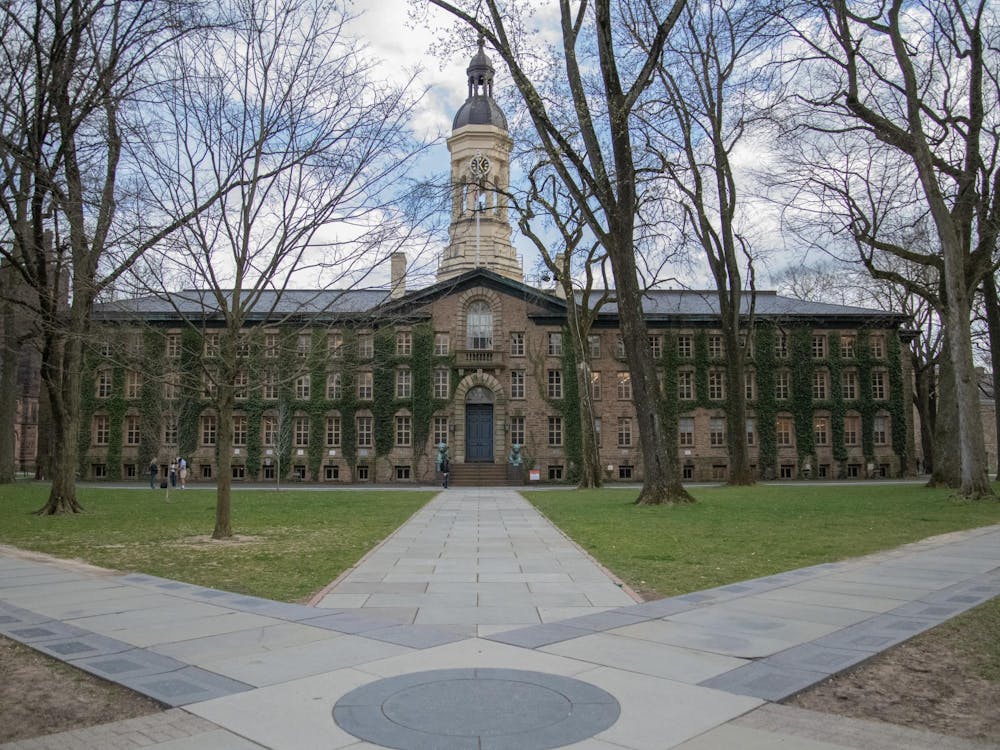On Friday, Dec. 18, the American Whig-Cliosophic Society (Whig-Clio) presented U.S. Representative Terri Sewell ’86 (D-Ala.) with its highest honor, the James Madison Award for Distinguished Public Service (JMA). Sewell is the first female African American recipient in the honor’s 60-year history.
During a virtual reception, Sewell, who appeared on The Daily Princetonian’s inaugural list of the Most Influential Princetonians in Politics last month, discussed her roots as a “little Black girl from Selma, Alabama,” her work across the political aisle, and using her Princeton education to give back.
Outgoing Whig-Clio Vice President Terrell Seabrooks ’21, who spearheaded Sewell’s recognition, found the choice “an easy one, to be honest.”
“She’s a Princetonian … her work in Congress is just so amazing,” he explained. “For those people who, you know, look like me, who look like her, it means something to see her with this award and achieving so much because it shows what we can do.”
In her opening speech, Sewell reflected on her journey from “a public school in Selma, Alabama” to “Princeton, Oxford, Harvard Law School, and now to be the United States Congresswoman from [her] home district of Alabama.”
“It was the gigantic leap both mentally and physically and geographically from Selma to Princeton,” she noted, “that the people of Princeton, my wonderful professors, my amazing classmates and friends helped me take to get to this journey.”
Speaking to over 70 attendees, Sewell emphasized gratitude and service.
“We are indeed blessed to have the opportunity to attend such an amazing institution and because of that I truly believe we must be a blessing to others,” she stated. “I hope we will all take a season of service to give back to our community and give back to our school.”
Christian Pollard ’23, a public and international affairs concentrator from Alabama, found inspiration in her journey.
“For me, coming to Princeton, especially when I first got there, I was a little bit insecure about where I came from because I do come from a rural area,” Pollard said. “[Sewell’s] also from a rural area, and then seeing her go to a place like Princeton and Harvard and Oxford, that’s just always been very, very inspiring to me.”
“Even the fact that she returned to Alabama after she went to Oxford and Harvard, I think it’s also really inspiring just how much she cares about where she came from and her state,” Pollard concluded.
After Sewell’s initial remarks, the event opened up to attendee questions. Reconciling change with compromise became a recurrent theme.

Incoming Undergraduate Student Government President Christian Potter ’22 asked Sewell for “advice to young leaders, activists, and citizens who want to make change in institutions that are often change averse.” In response, she evoked an adage from her mother, who was in attendance: “you have to bloom where you’re planted … you have to make a difference right where you are.”
“We can do so by acknowledging the issues that matter most to us and galvanizing like-minded individuals to build a consensus to actually make a difference,” she added.
Sewell acknowledged the challenges in pushing for change as the lone Democrat in Alabama’s Congressional delegation, noting that she “had to learn to compromise in order to get the resources and the opportunities” for her constituents.
“There are more things that combine us and that bind [Americans] together than that separate us,” Sewell continued, “and so trying to forge commonality trying to look for those areas where you can agree on and build out from there is critically important.”
After Sewell spoke about compromise, politics concentrator and Whig-Clio Treasurer Jane Mentzinger ’22 asked the Congresswoman whether she thought it would be “possible to work across the aisle over the next few years, and if so, what strategies [she’d] have for doing that.”
“I think that you have to figure out a way to achieve success, even in the midst of dissent,” Sewell said. She illustrated this belief in explaining her approach to negotiating COVID stimulus.
“I won’t tell you that I don’t feel frustrated, a lot of the time, even today as I wait for a negotiation to occur with the Senate, the House, and the President over another COVID relief package,” Sewell continued. “I want a big, bold package that will address all of the many needs of my constituents. And the reality is that Senate Republicans don't want a big package.”
Sewell laid out the two possibilities: compromising versus taking a hard line.
“We either could say, ‘Let’s just go home for Christmas holidays, I have no package,’ or we can figure out how we can get a package that we all can agree on as a bridge to a more fulsome package next year,” Sewell said. “And I for one will be working and have been working on doing just that.”
“We cannot let perfect be the enemy of good,” Sewell argued.
Incoming President of the Whig-Clio Senate Rebecca Han ’22, a left-leaning Alabama resident in a predominantly conservative district, felt “somewhat conflicted” over Sewell’s approach.
“I’m personally more attuned to more radical calls for change, but at the same time, I’m very interested in this question of what the most effective sort of advocacy is,” Han said. “[Sewell’s perspective] gave me a sense of how realism could be more productive.”
Han is a senior news writer for the ‘Prince.’
The conversation then shifted to the future of the Democratic party and its messaging, with questions coming from the Whig and Clio party heads.
Kai Tsurumaki ’23, incoming chair of the left-leaning Whig party, asked Sewell how Democrats could win votes in the South, with the upcoming Georgia Senate races in mind.
Sewell suggested that the party has “to choose to talk about the issues in a way that removes party labels.” She illustrated this approach through the example of her constituent Hank, a third-generation farmer who never had health insurance until he purchased Obamacare — pitched to him at the time only as “affordable, quality health care.”
“Four months after he [purchased healthcare], one of the tools caught hold of his hand and almost ripped his whole arm off. And he not only was able to save his hand, but he was also able to save his farm, because he had health insurance for the very first time,” Sewell explained.
“It’s Hank who said to me, ‘Congresswoman, had I known that it was Obamacare, I would have said hell no,’” she continued. “But because [the health insurance navigator] showed him a way that he could purchase using subsidies for the first-time health insurance for his family, he took that health insurance.”
Tsurumaki found this anecdote “really compelling.”
“The problem of labeling is really the advertising side of politics … it’s really hard not to support talking about how policies actually affect people, the fundamental nature of these things.”
When it came to advertising, incoming Clio party chair Matthew Wilson ’24 felt that he “didn’t really get a straight answer from her” when he asked whether the Democratic party planned on changing their messaging ahead of the 2022 midterms, in light of recent House seat losses.
“I however really appreciated her talking about working across the aisle,” Wilson said, “[and] felt she understood that parties are going to have to work together to accomplish bipartisan initiatives such as the COVID stimulus package.”
Sewell, when answering Wilson’s question, shared that “she tried to get to know [her Republican colleagues] as individuals first, not as R and D.”
“Because at the end of the day, I trust having gotten to know them, that they want the best for their constituents,” she added. “We articulate and advocate policies that are different ways of doing it. You know, that’s the American way.”
In one of the final questions, Sewell was asked how she remained positive while facing the challenges of 2020.
“I find hope in the fact that this democracy of ours, while struggling, while fiercely divided, ultimately, we find our way towards keeping marching towards that more perfect union,” she explained. “That can only be done when ordinary Americans challenged the system.”
Sewell then reflected on the loss of John Lewis, who she knew as a colleague, fellow Brown Chapel A.M.E Church member, friend, and activist.
Next year, Sewell plans to introduce the Voting Rights Advancement Act, which she noted was recently renamed the John Robert Lewis Voting Rights Act. The bill would restore key provisions of the Voting Rights Act of 1965, which the Supreme Court gutted in its 2013 Shelby v. Holder decision.
On the logic behind continuing Lewis’ legacy, Sewell said, “I remind my colleagues on the right that the Voting Rights Act was about protecting minority rights.”
“And while right now many communities of color are in the minority,” she noted, “[t]he browning of America is very real. The majority may become the minority, and that’s what the Voting Rights Act was about — protecting the voices of those that are in the minority.”
Sewell’s commitment to protecting voting rights drew politics concentrator Lucy Chuang ’21 to intern in Sewell’s congressional office the summer of 2019.
“Given the lack of diversity in American politics,” Chuang said, “it was really exciting, especially as a student of color, as a first-generation low-income college student, to see that Congresswoman Sewell was being awarded.”
Sewell credited her mother, Nancy Gardner Sewell, the first African American woman to sit on Selma’s city council, for inspiring her public service. In her daughter’s words, she “has been an amazing role model to me.”
But motivation from family, to Sewell, is also the “adoptive family and the adoptive community that you live in.” A third generation “Selmian,” Sewell explained that she “walk[s] the halls of Congress as a proud product of that environment in that community.”
“I carry with me their hopes and their dreams,” Sewell said.
On Sewell’s example, incoming Whig-Clio President Julia Chaffers ’22 noted, “It was so kind of her to talk about how Princeton and her family background shaped her commitment to service and others.”
Chaffers is an opinion columnist for the ‘Prince.’
“I think that it’s powerful for us,” Chaffers added, “as Princeton students to hear about, the way that we can kind of use our experiences to shape our approach to the world.”
As the event concluded, Sewell offered one final lesson to Princetonians.
“Our motto, though informal [it] may be — Princeton in the nation’s service and service of humanity — is one we should all take serious as blessings to others.”









